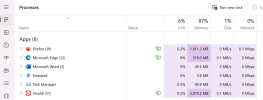NETWizz
Well-Known Member
- Reaction score
- 1,959
Why do they still make laptops with 8 GB of memory?
At work they ordered me some new fancy Dell All-In-On tablet/laptop machine with an Intel 13th generation i7 of some kind. Of coruse, I checked and it has 8 GB of RAM (soldered onto the motherobard), so I refusedi it.
Why does Dell, HP, and all those companies even offer less than say 16 GB of RAM this day and age?
It wouldn't be a problem, but we have bean counters who have zero (0) It knowledge. All they do is procure stuff. These are the type of people that end up buying things with a touch screen, tablet capability, some stupid stylist, and perhaps a 13900 or 13700 CPU ... but not enough RAM to open Chrome, Outlook, and Excel at the same time. It's nuts!
At work they ordered me some new fancy Dell All-In-On tablet/laptop machine with an Intel 13th generation i7 of some kind. Of coruse, I checked and it has 8 GB of RAM (soldered onto the motherobard), so I refusedi it.
Why does Dell, HP, and all those companies even offer less than say 16 GB of RAM this day and age?
It wouldn't be a problem, but we have bean counters who have zero (0) It knowledge. All they do is procure stuff. These are the type of people that end up buying things with a touch screen, tablet capability, some stupid stylist, and perhaps a 13900 or 13700 CPU ... but not enough RAM to open Chrome, Outlook, and Excel at the same time. It's nuts!


